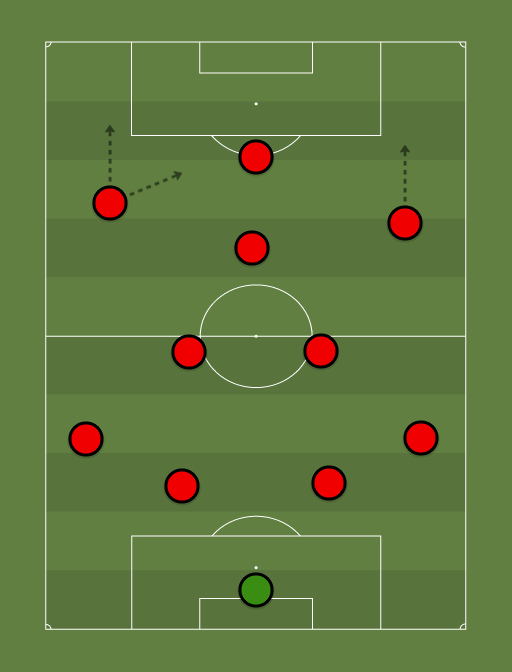When Sol Campbell controversially departed the Lane on a free transfer to arch-rivals Arsenal at the end of that season, Spurs fans were left without a defensive lynchpin. Campbell had come up through the youth academy and had just left in the worst possible manner. They were searching for someone new to call their own, but they didn’t have to look too far.
It was at this time that King stepped out of Campbell’s shadow and made the centre-back position his own. At the age of just 20, King was more often than not the youngest member in the Tottenham starting line-up, but it highlighted how mature he was and how he was able to adapt to his surroundings, something that would come in very handy towards the latter end of his career.
Glenn Hoddle had taken over from George Graham towards the end of the 2000/01 season and had made Spurs into a side that occasionally played with three central defenders, with King a huge part of that set-up. As King matured, and with more games under his belt, his qualities began to shine through. He wasn’t blessed with blistering pace – although he was hardly a couch potato – but had the mental awareness and defensive intelligence to be one step ahead of his man.
King may only have been coming into his 20s but he was so clever, rarely making poor judgements. While many defenders go to ground because they think it’s the only option, seeing their name in lights as the hero with the last-ditch tackle, King realised from a young age that if he stayed on his feet, didn’t give in to the attacker, kept his position, and made his move at the right time, he’d be tough to beat.
An injury towards the back end of the season against Arsenal meant that King had to sit out the remaining games, the 2002 World Cup and the majority of the 2002/03 season, something that would become the norm for King during his later career. What followed for Spurs was two more years of disappointment, which saw Hoddle replaced by Director of Football David Pleat until the end of the season, when Frenchman Jacques Santini would take over full-time.
While Santini had just guided France to the quarter-finals of Euro 2004, he left in November due to personal reasons to be replaced by his assistant Martin Jol, an appointment that would see King’s career go to the next level. By the time Jol had arrived, King was already being spoken about as one of the best English defenders in the Premier League alongside John Terry, Rio Ferdinand and his former teammate Sol Campbell, but his various knee troubles had begun to cause him intense pain, forcing him to miss game after game.
Despite that, Jol’s first season in charge at the club was special for all involved; for the first time in years, Spurs felt like they could achieve something again, and with Ledley King as captain, there was a lot of positivity around White Hart Lane. Alongside Michael Dawson, King formed yet another strong partnership that many Spurs fans consider to be one of the best they’ve seen.
King’s talent shone through as Spurs finished fifth, just beaten to the final Champions League spot by Arsenal thanks to a last-day defeat against West Ham which was dominated by the “Lasagna Gate” controversy. Regardless of the disappointment, Spurs fans looked upon the season as a positive, with King looking likely to be included in Sven-Göran Eriksson’s England squad for the 2006 World Cup following his impressive display at the previous competition, Euro 2004. But the first of a string of injuries meant that King had to miss out, and it got worse when he damaged his knee in pre-season training having recovered from his initial injury.
It was at this time that King’s career became both tragic and remarkable in equal measure. Not only are fans left wondering what could have been had he stayed fit, but also how on earth he managed to put in so many dominant performances despite only having one fully-functioning knee.
King went on to make 27 appearances for Spurs the following season as the club once again finished fifth, but one performance stood out head and shoulders above the rest. Tottenham hadn’t beaten Chelsea at White Hart Lane since 1987 and hadn’t beaten them in the league since 1990, but King put in an inspired performance as Spurs came out of the clash victorious. His tackle on Arjen Robben remains one of the finest examples of defending in the club’s history.
By July 2012, King had announced his retirement from football due to his chronic injuries and pain. It was a day of sorrow for King, the club and the fans, but his announcement highlighted just how well-respected and rated he was by fans of other clubs, with a number of former foes paying tribute to a man many consider to be one of the most intelligent and complete English defenders produced in recent decades.
Indeed, Thierry Henry said: “I don’t like defenders who hold the shirts of other players. The only defender here who doesn’t do that and still gets the ball off my feet easily is Ledley King. He is the only guy who doesn’t hold players. He will get the ball off you without you even noticing.”
Unsurprisingly, King remains a popular figure at the club. He’s still a part of Tottenham as an ambassador, still sung about by the fans, and still sorely missed. What remain are the memories of his inspiring leadership from defence, and the inevitable what ifs. It wouldn’t be hyperbole to suggest that King could’ve been one of the world’s best central defenders had injuries not ruined a career heading towards its peak




